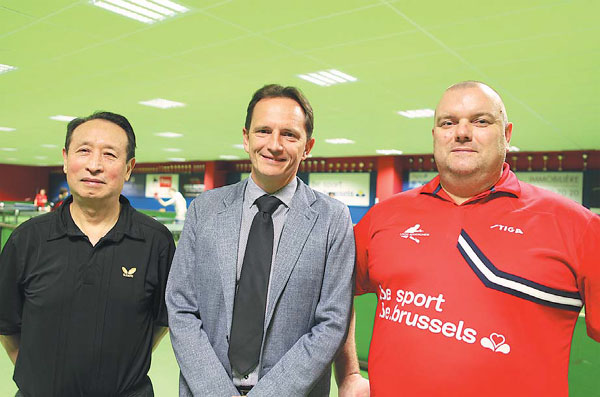Table tennis 'should be fashionable'
By Fu Jing (China Daily Europe) Updated: 2017-02-26 15:06Champion Jean-Michel Saive and his former coach, Wang Dayong, instruct Belgian players at a club in Brussels
The 47-year-old former world table tennis champion Jean-Michel Saive says his pragmatic approach to reforming the game will help him win the presidency of the International Table Tennis Federation.
Saive, who was mentored by renowned Chinese coach Wang Dayong, also pledged that the federation, based in Lausanne, Switzerland, will work closely with China if he wins the presidency. The vote will take place on May 31 in Dusseldorf, Germany.
Saive announced his participation in the election last month. Current ITTF President Thomas Weikert, who is from Germany, said in October that he would be running. So will Khalil Al-Mohannadi, president of the Qatar Table Tennis Association.
|
Candidate for the presidency of the International Table Tennis Federation Jean-Michel Saive (center) and his former coach Wang Dayong (left) are instructing Belgian players at a table tennis club in Brussels. Fu Jing / China Daily |
"In running my campaign I am filled with full confidence and optimism to win," says Saive during an interview with China Daily at a table tennis club in the outskirts of Brussels.
He added that after announcing his intention to run for president of the ITTF, he received positive responses from the table tennis community and from the sports world generally.
Saive even met Cai Zhenhua, a former table tennis player and sports executive, in Beijing recently.
"The talks are quite active, although China cannot announce which candidate it will support right now," Saive says.
A total of 222 ITTF member associations will be voting in May to decide the leadership.
Wang, the former coach of the Belgian national team, says Saive had many advantages that would make him an ideal candidate for the role.
"He is not only a professional player but has demonstrated tremendous leadership at various levels," says Wang, who started to train Saive in the late 1980s.
Meanwhile, Wang says his links to China and better understanding of the country would also help him manage the federation better.
"He has aimed to make the sport more global and attractive, and cooperation with China in that respect is vital," says Wang.
Saive, whose parents and younger brother are also noted table tennis players in Europe, has visited China almost 40 times and has maintained relations with Chinese players and the international table tennis community.
"This will help him implement a reform agenda if he wins the election," Wang says, adding that China occupies nearly half the world's top-100 table tennis positions. "Making it global will benefit China and the rest of the world," he says.
Saive announced his retirement in 2015 but kept his former world No 1 ranking for 17 months. He was a silver medalist at the 1993 World Championships, European champion in 1994, a silver medalist at the 2001 World Championships (Team) and is a seven-time Olympian.
Saive was one of the founders of the Club of Table Tennis Professionals in the 1990s and has been an active member of the National Olympic Committee since 2001, serving in various positions, including board member and chair of the Athletes' Commission since 2013.
In 2009, he became a member of the European Olympic Committee and currently serves as chair of the Athletes' Commission and on the EOC board.
During the campaign, Saive says the ITTF has one of the best development programs in the world of sport, and its staff and volunteers work extremely hard on a daily basis, with limited funds and resources, to develop the sport worldwide.
"My intent is to double the development budget and provide the necessary human resources to spread our sport throughout every part of the world," Saive says.
Though he is ambitious about reforms, Saive also says stability was key until the next Summer Olympics, which will be held in Tokyo in 2020.
"I want to convince all levels of decision-makers within the ITTF not to make any more changes to the laws of table tennis for a set period of time," Saive says. "Instead, out of official competitions, we can welcome experiments and tests to evaluate the effect any changes would have. I believe that we need this period of stability."
He also says the federation should revitalize its marketing strategies and introduce new global sponsors and advertisers and provide a high return on investment in terms of the promotion and visibility of their products.
"We must make table tennis more fashionable", he says.
fujing@chinadaily.com.cn
- 'Cooperation is complementary'
- Worldwide manhunt nets 50th fugitive
- China-Japan meet seeks cooperation
- Agency ensuring natural gas supply
- Global manhunt sees China catch its 50th fugitive
- Call for 'Red Boat Spirit' a noble goal, official says
- China 'open to world' of foreign talent
- Free trade studies agreed on as Li meets with Canadian PM Trudeau
- Emojis on austerity rules from top anti-graft authority go viral
- Xi: All aboard internet express












